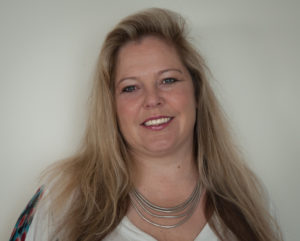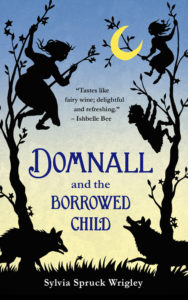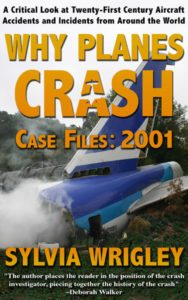 1. What do new readers need to know about Sylvia Spruck Wrigley?
1. What do new readers need to know about Sylvia Spruck Wrigley?
They should know that the sense of time and place in my stories is very variable. I’m German-American and I’ve spent more time living in Spain and the UK than I have in either of the countries that I come from. I am currently living in Tallinn, Estonia. I love to explore the nature of places (and culture and questions and homelessness) but sometimes people come to my stories with expectations based on the first thing they’ve read that I’ve written. So there’s this shared understanding, which is great, but then things don’t quite fit and I guess it can be confusing.
So sometimes I get confused email insisting on knowing where I’m from. And the answer to where I’m from is not an easy question to answer (and harder still for my son, who has never lived in any of the countries that he holds citizenship for, but has spent his lift split between two countries who don’t consider him a citizen).
I guess they should also know that Spruck is a middle name (although it is my mother’s maiden name and the name I commonly go by in Germany), so in order to find my work, they should be looking under W not under S.
2. When did you first decide you wanted to be a writer and can you recall the story that made you feel that way?
That’s so hard to answer! I remember Peter Beagle’s The Last Unicorn and Mary Stewart’s Crystal Cave series as being the books where I became aware that there was more to a story than just the story-shaped thing. I became aware of good writing and that the way of telling a story could be as important as the story itself.
I know I wanted to be a writer at a fairly young age. The first thing I wanted to be was the first woman on the moon but after that, I talked about being a writer. I don’t really know how that happened or where it came from, so I asked my mother:
What stuck with me is the middle school paper you wrote on free speech and you mentioned “pornography” and the free speech movement (Bob Brophy) and your teacher never responded to content (it was brilliant) but took off major points for surface level mistakes I think it’s good to say that there was not one epiphany (there seldom is) it a mounting trail of evidence that you could do better. And I don’t remember you ever not have a journal from age 7 on – and a need to capture ideas and put your thought on paper. And there was Reginald Clark before then and the power of words.
3. What was the inspiration for Domnall and the Borrowed Child?
I always wanted to go to Ireland, it seemed such a beautiful and magical place. And one night, I dreamt I had gone and the next morning, walking to work, I saw a big poster with green hills and stunning scenery in the window of the travel agents. I walked in on the spot. It was a coach tour to Scotland. I decided that was close enough (Hah) and walked in and booked a ticket. Turned out, I was the only bilingual person on the tour, so I got railroaded on the spot to translate, taking the German tourists around the Scottish highlands. I loved everything about it and ended up taking a job there for the season. I wrote a lot while I was there, mainly bad poetry. But the big thing was that I immersed myself in the myths and legends. We often drove for hours and I wanted to be able to tell the tourists about the countryside and keep them interested — although really, all that was expected of me was “And we will meet back on the bus in one hour”. There was no world-wide web at the time, of course, but people found ways of sharing stories anyway. In every village, there would be a small shop (at least one!) selling shortbread and cheap jewelry and cassette tapes of mediocre bagpipe playing. And in most of these shops, there were small pamphlets, just paper stapled together, of a local story written by someone in the village. Sometimes they were historical or to do with a specific building in the village or a battle that happened. I read those too. But the ones I loved were fantasy stories about the wailing woman of the ford and the sea-horse-monsters and the witch that lived on the hill. I bought every one that I could find and read them all. I wonder if you can still get these.
Later, I noticed that most Celtic mythology seems to be focused on the Irish myths, the banshee rather than the bean nighe, especially when it came to fairy lore. And it seemed like some of the old Scottish versions were getting confused and overwritten by these Irish stories.
Domnall and the Borrowed Child came as a part of those pamphlets I read back then and trying to make sense, in my own head, how the world would work from their point of view. That’s why, I think, there’s a sense of Domanll in a greater world, that this is just one piece of it. Because it was very deliberately part of something bigger.
4. Can you remember what the first fairy or folk tale was to make an impact on you?

Cover art by Kathleen Jennings (of course!)
My first fairy tales were German. Max und Moritz, Struwwelpeter, die Heinzelmännchen. My mother got some flak for reading me the original Grimms Märchen when we moved to the US, because of the Evil Stepmother Queen dancing on hot coals until her feet fell off sort of endings. She says that the only time I got upset, though, was when she took me to watch the Disney version of Snow White. Apparently, I started sobbing when she was lost in the forest and just never stopped. My mother had to take me out and she never took me to see another Disney movie. Luckily, my dad did (don’t tell her).
I couldn’t tell you which had the most influence because fairy tales were such a pervasive part of my childhood.
5. How do you schedule your work day?
I’m not very good at waking up and doing things but over time it’s become clear that I do my best writing in the mornings, much to my disgust. So I try to plan things so that I can write in the morning before the rest of the world takes over my brain.
If I have a deadline, I’ll set the alarm an hour earlier to get extra writing time in but I’m not crazy about stealing sleep in order to get my writing done; eventually I turn into a witless zombie and fall over.
If I have the full day free to write, then I spend most of it browsing the web, so I try to make sure not to have the whole day free unless I have someone waiting for me: I react very well to deadlines and pressure.
I tend to work on a single project at a time; I’m not good at changing gears. So for example, I’ll work on an aviation book for a month straight and then put it aside and work on fiction, a short story or maybe a novel (I’m not good at novels but I’m working on it). I’m not one of those people with a dozen projects on the go. Or rather, I am, because I’m terribly addicted to shiny new ideas, but I work on them completely sequentially.
So the perfect work day, from a writing point of view, is two hours in the morning, followed by Everything Else That Needs Doing. I have the occasional binge days and when getting close to finished, I’ll spend more time. But for the bulk of the work, it’s done in that slot.
6. You can take five books to a desert island with you: which ones do you choose?
BIG THICK ONES. I’d be tempted to choose my old favourites, sagas that span decades, like Lord of the Rings and Thorn Birds and Pillars of the Earth. And as a kid, I devoured Roots and Gone with the Wind over and over and over. So I could see killing some time on the island with those although now I’m much more aware of the problematic perspectives so a lot of that time would just be ranting. If I could choose Song of Ice and Fire as a single book, I would take it, as I can imagine reading that repeatedly and finding new things every time. But I wouldn’t want the first five books as my entire reading material, that would be terrible.
The thing is, whatever books I took would get ruined in the sun and wind and wet really quickly. People talk about how much they love real books but what I love MOST about e-books is that I don’t have to decide what book to take with m e on holiday. I love the fact that I can keep them *all* in my bag and pick on the spur of the moment. So I’m going to cheat and say that I would take five Kindles.
7. Do you think fairy and folk tales will always have something to say to readers and writers?
Absolutely.
8. You’re an aviator – what attracted you to flying?
Help! I’ve written novellas on this subject, I’m not sure I can cover it in a paragraph or two. 😀
I’ve always loved being in airplanes. When I was little, I flew from Los Angeles to Frankfurt every year and then back again. It was magical to be above everyone like that, untethered. One of my first memories is of the sudden clarity that those mini-cars down there were real and held people in them, going to work or home or whatever. I felt both locked away and safe. I’m sure there was also an aspect of changing cultures and languages that made me appreciate that cut-off time in between.
I never thought about flying myself until my boyfriend told me he wanted to renew his pilot’s license. I thought I should sit in on a few lessons to see what it was like. The course instructor explained to me that it might be a bit much for me and that maybe I should just go for a Wife’s License. I was incensed and went for the full license, of course. Before I knew it, I was hooked.
(Unabashed advertisement: I wrote all about the experience in You Fly Like a Woman, a short read which is available at most e-book stores.)
9. What scares you?
Flying.
Seriously, being in control of an aircraft will never stop scaring the hell out of me. I had to learn that making a decision, even a wrong one, is more important than dithering and hoping that things will somehow turn out all right. That there wasn’t anyone else who was going to fix things. There was no safety net: if I completely screwed up this landing, the plane would crash and I would die. So, better not screw it up, right?
Which feeds right into the other thing that scares me: doing things wrong. I have an outsized fear of looking stupid or incompetent because I don’t know how something works, so I’ll tend to hang back and watch. Obviously, this is often a good thing but it can become debilitating, refusing to actually do anything at all because I might not do it right. I have a couple of times set myself up challenges to do things that I’m frightened or nervous about at least once a day, and it’s amazing (to me at least) how trivial some of these things are. I have to work pretty hard to keep my own avoidance at bay.
I’m also a little bit afraid of spiders. Not being bitten, just the idea of eight legs slowly and deliberately walking across my skin. GAH.
10. What is next for Sylvia Spruck Wrigley? 
Right now my life is pretty charmed. I’ve just moved to Estonia after a month of travelling through Scandinavia. My days are filled with exploring Tallinn and visiting all the markets and experiencing as much as I can. I’m feeling very lucky that I have the chance to experience such a beautiful and foreign place at this stage of my life, so I’m really trying to make the most of it. I’ve had fun writing humorous essays about the people I’ve met and the places that I’m seeing (I have a mailing list for this, you can sign up here: http://eepurl.com/bTMGpT ).
I write books about aviation incidents and have started the fourth book in my Why Planes Crash series, which covers a selection of accidents from 2004. I’m also working on a more mainstream aviation book, *Without a Trace* which looks at aircraft which have disappeared during the history of flight, starting with a hot air balloon drifting over the English Channel (some of the silk was eventually found in the Spanish Pyrenees) and ending with MH370. I hope to have that out by the summer.
In terms of fiction, I have some contracted work that I’m doing (corporate science fiction) but other than that, I don’t have any commitments. So I’m spending my spare time experimenting with novel arcs and pacing and reader expectations at different lengths. Part of this involves reading a lot of very structured genres, so I’m devouring romance and cozies and action thrillers at the moment and calling it work. It’s fun! I would like to start work on a new fantasy novel in the second half of the year but I’m not putting too much pressure on myself. There’s always so much to do!
This time next year, I’ll turn 50, so I’m really looking forward to finding out what’s next then! It feels like it’ll be the start of something special.


One Response to Domnall and the Borrowed Child: Sylvia Spruck Wrigley